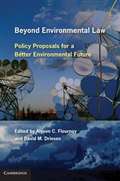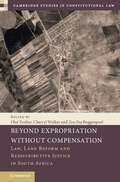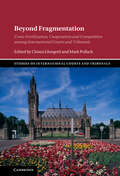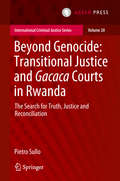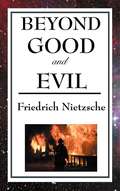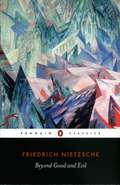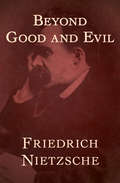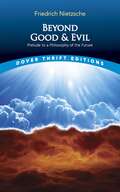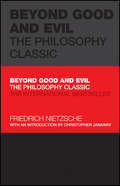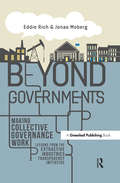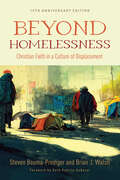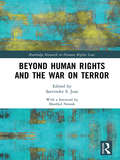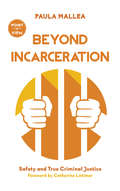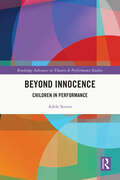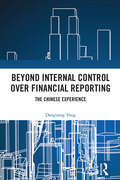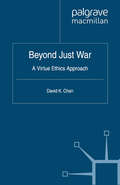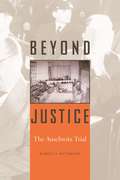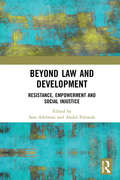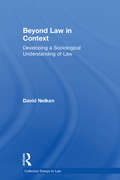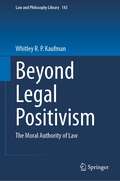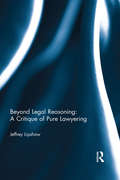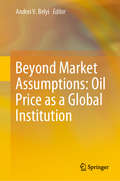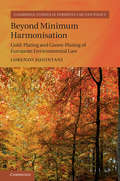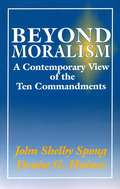- Table View
- List View
Beyond Environmental Law
by Alyson C. Flournoy David M. DriesenThis book offers a vision for the third generation of environmental law designed to enhance its ability to protect our environment. The book presents two core proposals, an Environmental Legacy Act to preserve a defined environmental legacy for future generations and an Environmental Competition Statute to spark movement to new clean technologies. The first proposal would require, for the first time, that the federal government define an environmental legacy that it must preserve for future generations. The second would establish a market competition to maximize environmental protection. The balance of the book provides complimentary proposals and analysis. The first generation of environmental law sought broad protection of health and the environment in a fairly fragmented way. The second sought to enhance environmental law's efficiency through cost-benefit analysis and market mechanisms. These proposals seek to create a broader, more creative approach to solving environmental problems.
Beyond Expropriation Without Compensation: Law, Land Reform and Redistributive Justice in South Africa (Cambridge Studies in Constitutional Law)
by Olaf Zenker Cherryl Walker Zsa-Zsa BoggenpoelSpeeding up land reform through a constitutional amendment that would explicitly permit the expropriation of land without compensation has dominated legal and political-policy debates in South Africa in recent years. Taking this politically and emotionally charged issue as its starting point, this volume offers both expert commentary on this issue from a variety of disciplinary perspectives and also fresh ideas on how to advance the redistributive transformation that South Africa so urgently needs. It brings critically important debates around transformative property law, the need for diversified land justice and the possibilities of alternative forms of redistribution into productive conversation with each other. While grounded in the complex realities of South Africa's past and present, the volume speaks to concerns that resonate in many contexts in the Global South and beyond. It will appeal to scholars, students, policymakers and general readers concerned with both the theory and practice of redistributive justice. This title is also available as Open Access on Cambridge Core.
Beyond Fragmentation: Cross-Fertilization, Cooperation and Competition among International Courts and Tribunals (Studies on International Courts and Tribunals)
by Mark Pollack Chiara GiorgettiBeyond Fragmentation assembles a unique team of expert practitioners and leading scholars to explore and advance the study of cross-fertilization among international courts and tribunals. Using an inter-disciplinary and multi-method approach, contributors analyse how international courts and tribunals interact and why it matters in practice. After a thorough review of prior assessments of cross-fertilization and fragmentation, the editors offer a new take on competition and cooperation across courts and tribunals, exploring both substantive and procedural elements as well as the diverse agents of cross fertilization. Contributors engage with procedural issues, identifying a “procedural cross-fertilization pull” and why and how procedure is converging in international courts and tribunals. Case studies on the convergence in the law of the sea and at the European Court of Human Rights provide contrasting experiences of substantive cross-fertilization. The volume also identifies a variety of agents of cross-fertilization, including judges, litigants, counsel, and international organizations.
Beyond Freedom's Reach
by Adam RothmanAfter Union forces captured New Orleans in 1862, Rose Herera's owners fled to Havana, taking her three children with them. Adam Rothman tells the story of Herera's quest to rescue her children from bondage after the war. As the kidnapping case made its way through the courts, it revealed the prospects and limits of justice during Reconstruction.
Beyond Genocide: The Search for Truth, Justice and Reconciliation (International Criminal Justice Series #20)
by Pietro SulloCombining both legal and empirical research, this book explores the statutory aspects andpractice of gacaca courts (inkiko gacaca), the centrepiece of Rwanda’s post-genocide transitionaljustice system, assessing their contribution to truth, justice and reconciliation. Thevolume expands the knowledge regarding these courts, assessing not only their performancein terms of formal justice and compliance with human rights standards, but also their actualmodus operandi.Scholars and practitioners have progressively challenged the idea that genocide should beaddressed exclusively through ‘westernised’ criminal law, arguing that the uniqueness ofeach genocidal setting requires specific context-sensitive solutions. Rwanda’s experience withgacaca courts has emerged as a valuable opportunity for testing this approach, offering newhome-grown solutions for dealing with the violence experienced in 1994 and beyond that werenever previously tried. Due to their unique features, gacaca courts have attracted the attentionof researchers from different disciplines and triggered dichotomous reactions and appraisals.Anchoring the assessment of gacaca courts in a comprehensive legal analysis in conjunctionwith field research, this book addresses the tensions existing within the literature. Throughthe direct observation of gacaca trials, interviews and informal talks with genocide survivors,defendants, ordinary Rwandans, academics and practitioners, a purely legalistic perspectiveis overcome, offering instead an innovative bottom-up approach to meta-legal concepts suchas justice, fairness, truth and reconciliation. Outlining their strengths and shortcomings, thisbook highlights what aspects of gacaca courts can be useful in other post-genocide contexts,and provides crucial lessons learned in the realm of transitional justice.The book is primarily aimed at researchers working in, among others, the areas of internationalcriminal law, genocide and transitional justice, while practitioners, students and others with aprofessional interest in the topics addressed may also find the issues raised relevant.Pietro Sullo teaches public international law and international diplomatic law at the BrusselsSchool of International Studies of the University of Kent in Brussels. He is particularlyinterested in international law, human rights, transitional justice, international criminal lawand refugee law.
Beyond Good and Evil
by Friedrich NietzscheIn Beyond Good and Evil, Nietzsche attacks past philosophers for their alleged lack of critical sense and their blind acceptance of the Christian premises in their consideration of morality. The work attempts to move "beyond good and evil," in the sense of leaving behind the traditional morality which Nietzsche subjects to a destructive critique in favor of what he regards as an affirmative approach that fearlessly confronts the perspectival nature of knowledge and the perilous condition of the modern individual.
Beyond Good and Evil
by Friedrich Nietzsche'One of the greatest books of a very great thinker' Michael TannerBeyond Good and Evil confirmed Nietzsche's position as the towering European philosopher of his age. The work dramatically rejects traditional Western thought with its notions of truth and God, good and evil. Nietzsche seeks to demonstrate that the Christian world is steeped in a false piety and infected with a 'slave morality'. With wit and energy, he turns from this critique to a philosophy that celebrates the present and demands that the individual impose their own 'will to power' upon the world.Translated by R. J. HOLLINGDALE With an Introduction by MICHAEL TANNER
Beyond Good and Evil: Prelude To A Philosophy Of The Future (Barnes And Noble Library Of Essential Reading Ser.)
by Friedrich NietzscheFriedrich Nietzsche's trailblazing, incendiary book sets dogmatic philosophy and traditional morality alight One of the most important works in philosophical history, Beyond Good and Evil consists of 296 sections and a final "aftersong." Therein, Nietzsche articulates his views on philosophy, philosophers, morality, religion, society, people, and culture. As challenging as it is rewarding, Beyond Good and Evil will command you, confront you, and provoke you into reconsidering your perception of the modern world. This ebook has been professionally proofread to ensure accuracy and readability on all devices.
Beyond Good and Evil: Prelude to a Philosophy of the Future (Dover Thrift Editions)
by Friedrich NietzscheAfter kicking open the doors to twentieth-century philosophy in Thus Spake Zarathustra, Friedrich Nietzsche refined his ideal of the superman with the 1886 publication of Beyond Good and Evil. Conventional morality is a sign of slavery, Nietzsche maintains, and the superman goes beyond good and evil in action, thought, and creation. Nietzsche especially targets what he calls a "slave morality" that fosters herdlike quiescence and stigmatizes the "highest human types."In this pathbreaking work, Nietzsche's philosophical and literary powers are at their height: with devastating irony and flashing wit he gleefully dynamites centuries of accumulated conventional wisdom in metaphysics, morals, and psychology, clearing a path for such twentieth-century innovators as Thomas Mann, André Gide, Sigmund Freud, George Bernard Shaw, André Malraux, and Jean-Paul Sartre, all of whom openly acknowledged their debt to him.Students of philosophy and literature as well as general readers will prize this rich sampling of Nietzsche's thought in an unabridged and inexpensive edition of one of the philosopher's most important works.
Beyond Good and Evil: The Philosophy Classic (Capstone Classics)
by Friedrich NietzscheA deluxe, high-quality edition of Friedrich Nietzsche’s seminal work Beyond Good and Evil is one of the final books by German philosopher Friedrich Nietzsche. This landmark work continues to be one of the most well-known and influential explorations of moral and ethical philosophy ever conceived. Expanding on the concepts from his previous work Thus Spoke Zarathustra, Nietzsche adopts a polemic approach to past philosophers who, in his view, lacked critical sense in accepting flawed premises in their consideration of morality. The metaphysics of morality, Nietzsche argues, should not assume that a good man is simply the opposite of an evil man, rather merely different expression of humanity’s common basic impulses. Controversial in its time, as well as hotly debated in the present, Nietzsche’s work moves beyond conventional ethics to suggest that a universal morality for all human beings in non-existent – perception, reason and experience are not static, but change according to an individual’s perspective and interpretation. The work further argues that philosophic traditions such as “truth,” “self-consciousness” and “free will” are merely inventions of Western morality and that the “will to power” is the real driving force of all human behaviour. This volume: Critiques the belief that actions, including domination or injury to the weak, can be universally objectionable Explores themes of religion and “master and slave” morality Includes a collection of stunning aphorisms and observations of the human condition Part of the bestselling Capstone Classics Series edited by Tom Butler-Bowdon,this collectible, hard-back edition of Beyond Good and Evil provides an accessible and insightful Introduction by leading Nietzsche authority Dr Christopher Janaway. This deluxe volume is perfect for anyone with interest in philosophy, psychology, science, history and literature.
Beyond Governments: Making Collective Governance Work - Lessons from the Extractive Industries Transparency Initiative
by Eddie Rich Jonas MobergIn a world characterized by globalization, governments increasingly find themselves unable to govern. Corruption is everywhere, natural resources are being exploited, the environment damaged, markets distorted, and the fight against poverty is often ineffective. Certain challenges cannot be addressed by governments alone. Increasingly, collective governance “beyond governments” is seen as part of the solution, with state and non-state actors working together. This book sets out a framework for those wishing to implement collective governance, involving civil society, companies and governments as key actors. Based on over eight years of running the most advanced example of collective governance at international level, the Head and Deputy Head of the Extractive Industries Transparency Initiative (EITI) outline the practicalities and pitfalls, and draw out the experience of the EITI as a case example. Beyond Governments tells a positive story of how this type of innovative governance can make real achievements, but also cautions against those who see collective governance as a silver bullet to solve development challenges. It provides practical guidance from a practitioner’s perspective and is essential reading for those in government, business and academia.
Beyond Homelessness, 15th Anniversary Edition: Christian Faith in a Culture of Displacement
by Steven Bouma-Prediger Brian J. WalshEnvision a future beyond homelessness. The rise in homeless encampments. The destruction of our planet. The disconnection from place caused by capitalism and technology. Beyond the unavailability of housing, our culture is experiencing a devastating loss of home.In Beyond Homelessness, Steven Bouma-Prediger and Brian Walsh illuminate the relationship between socioeconomic, ecological, and cultural homelessness. Bouma-Prediger and Walsh blend groundbreaking scholarship with stirring biblical meditations, while enriching their discussion with literature, music, and art. Offering practical solutions and a hope-filled vision of home, they show how to heal the profound dislocations in our society. In this fifteenth-anniversary edition, the authors return to their work with a new postscript, in which they discuss the evolution of their ideas and share true stories of home and community built anew. This revitalized classic is a must-read for any Christian committed to social justice—and anyone longing for home.
Beyond Human Rights and the War on Terror (Routledge Research in Human Rights Law)
by Satvinder S. JussThis edited collection provides a comprehensive, insightful, and detailed study of a vital area of public policy debate as it is currently occurring in countries across the world from India to South Africa and the United Kingdom to Australia. Bringing together academics and experts from a variety of jurisdictions, it reflects upon the impact on human rights of the application of more than a decade of the "War on Terror" as enunciated soon after 9/11. The volume identifies and critically examines the principal and enduring resonances of the concept of the "War on Terror". The examination covers not only the obvious impacts but also the more insidious and enduring changes within domestic laws. The rationale for this collection is therefore not just to plot how the "War on Terror" has operated within the folds of the cloak of liberal democracy, but how they render that cloak ragged, especially in the sight of those sections of society who pay the heaviest price in terms of their human rights. This book engages with the public policy strand of the last decade that has arguably most shaped perceptions of human rights and engendered debates about their worth and meaning. It will be of interest to researchers, academics, practitioners, and students in the fields of human rights law, criminal justice, criminology, politics, and international studies.
Beyond Incarceration: Safety and True Criminal Justice
by Paula Mallea Catherine LatimerA call to replace Canada’s incarceration model, which has proven destructive, discriminatory, expensive, counterproductive, and — most of all — unnecessary. Imprisonment developed in the Western world as the punishment to suit all offences, from violent assault to victimless drug use. Centuries ago, incarcerating convicts represented progress on society’s part, since it came as a replacement for capital punishment, maiming, and torture. Our current model — taking away convicts’ freedom and holding them in degrading and unhealthy prison conditions — promotes recidivism and jeopardizes public safety. It is highly discriminatory, with disproportionate numbers of ethnic, indigenous, mentally ill, drug-dependent, poor, and otherwise marginalized people imprisoned. It is also ruinously expensive. Elsewhere, alternative correctional systems successfully rehabilitate offenders while treating them with dignity and respect. This book lays out the case for a complete overhaul of Canada’s ineffective incarceration model of criminal justice and for a new approach.
Beyond Innocence: Children in Performance (ISSN)
by Adele SeniorOn a global platform we are witnessing the increased visibility of the people we call children and teenagers as political activists.Meanwhile, across the contemporary performance landscape, children are participating as performers and collaborators in ways that resonate with this figure of the child activist. Beyond Innocence: Children in Performance proposes that performance has the ability to offer alternatives to hegemonic perceptions of the child as innocent, in need of protection, and apolitical. Through an in-depth analysis of selected performances shown in the UK within the past decade, alongside newly gathered documentation on children’s participation in professional performance in their own words, this book considers how performance might offer more capacious representations of and encounters with children beyond the nostalgic and protective adult gaze elicited within mainstream contexts. Motivated by recent collaborations with children on stage that reimagine the figure of the child, the book offers a new approach to both reading age in performance and also doing research with children rather than on or about them. By redressing the current imbalance between the way that we read children and adults’ bodies in performance and taking seriously children’s cultures and experiences, Beyond Innocence asks what strategies contemporary performance has to offer both children and adults in order to foster shared spaces for social and political change. As such, the book develops an approach to analysing performance that not only recognises children as makers of meaning but also as historically, politically, and culturally situated subjects and bodies with lived experiences that far exceed the familiar narratives of innocence and inexperience that children often have to bear.
Beyond Internal Control over Financial Reporting: The Chinese Experience
by Daoguang YangBy examining two different modes of internal control and the fundamentals of risk management, this book analyses the role of internal control in financing, investment, profit distribution, and corporate strategies through China's experience. In doing so, it confirms the effectiveness and superiority of internal control over operation and management. The book compares the various internal control methods used in China and the USA, namely, operation and management-oriented versus financial reporting-oriented approaches. It also discusses the differences in corporate risk attitudes and behaviours under the two approaches. The author then proposes the hyper-correction hypothesis and the trimming hypothesis. Empirical findings regarding corporate cash policy, mergers and acquisitions, tax avoidance, and diversification strategy reveal that internal control in China does not result in undue risk aversion but instead manages enterprise risk within a reasonable capacity. These results support the trimming hypothesis and demonstrate that internal control is a useful risk management tool. The title will appeal to students, academics, and accounting professionals interested in internal control (risk management), accounting, auditing and corporate finance, regulation and governance.
Beyond Just War: A Virtue Ethics Approach
by David K. ChanUnlike most books on the ethics of war, this book rejects the 'just war' tradition, proposing a virtue ethics of war to take its place. Like torture, war cannot be justified. It answers the question: 'If war is a very great evil, would a leader with courage, justice, compassion, and all the other moral virtues ever choose to fight a war?'
Beyond Justice: The Auschwitz Trial
by Rebecca WittmannIn 1963, West Germany was gripped by a dramatic trial of former guards who had worked at the Nazi death camp Auschwitz. It was the largest and most public trial to take place in the country and attracted international attention. Using the pretrial files and extensive trial audiotapes, Rebecca Wittmann offers a fascinating reinterpretation of Germany's first major attempt to confront its past. Evoking the courtroom atmosphere, Wittmann vividly recounts the testimony of survivors, former SS officers, and defendants--a cross-section of the camp population. Attorney General Fritz Bauer made an extraordinary effort to put the entire Auschwitz complex on trial, but constrained by West German murder laws, the prosecution had to resort to standards for illegal behavior that echoed the laws of the Third Reich. This provided a legitimacy to the Nazi state. Only those who exceeded direct orders were convicted of murder. This shocking ruling was reflected in the press coverage, which focused on only the most sadistic and brutal crimes, allowing the real atrocity at Auschwitz--mass murder in the gas chambers--to be relegated to the background. The Auschwitz trial had a paradoxical result. Although the prosecution succeeded in exposing SS crimes at the camp for the first time, the public absorbed a distorted representation of the criminality of the camp system. The Auschwitz trial ensured that rather than coming to terms with their Nazi past, Germans managed to delay a true reckoning with the horror of the Holocaust.
Beyond Law and Development: Resistance, Empowerment and Social Injustice
by Sam AdelmanThe book highlights new imaginaries required to transcend traditional approaches to law and development. The authors focus on injustices and harms to people and the environment, and confront global injustices involving impoverishment, patriarchy, forced migration, global pandemics and intellectual rights in traditional medicine resulting from maldevelopment, bad governance and aftermaths of colonialism. New imaginaries emphasise deconstruction of fashionable myths of law, development, human rights, governance and post-coloniality to focus on communal and feminist relationality, non-western legal systems, personal responsibility for justice and forms of resistance to injustices. The book will be of interest to students and scholars of development, law and development, feminism, international law, environmental law, governance, politics, international relations, social justice and activism.
Beyond Law in Context: Developing a Sociological Understanding of Law (Collected Essays in Law)
by David NelkenThis intriguing collection of essays by David Nelken examines the relationship between law, society and social theory and the various ideas social theorists have had about the actual and ideal 'fit' between law and its social context. It also asks how far it is possible to get beyond this mainstream paradigm. The value of social theorising for studying law is illustrated by specific developments in substantive areas such as housing law, tort law, the law of evidence and criminal law. Throughout the chapters the focus is on the following questions. What is gained (and what may be lost) by putting law in context? What attempts have been made to go beyond this approach? What are their (necessary) limits? Can law be seen as anything other than in some way both separate from and relating to 'the social'? The distinctiveness of this approach lies in its effort to keep in tension two claims. Firstly, that social theorising about legal practices is vitally important for understanding the connections between legal and social structures and revealing what law means and does for (and to) various social actors. The second point is that it does not follow that what we learn in this way can be assumed to be necessarily relevant to (re)shaping legal practices without further argument that pays heed to law's specificity.
Beyond Legal Positivism: The Moral Authority of Law (Law and Philosophy Library #143)
by Whitley R. KaufmanLegal Positivism has been the dominant school of legal philosophy for much of the last century, despite its many critics. Its central tenet has long been that there is no necessary connection between law and morality. This book provides a broad but clear and jargon-free account of the central objections to the theory and why those objections are sufficient to show that legal positivism is no longer tenable. This includes a broad critique of the purported distinction method of legal positivism, the idea of ‘conceptual analysis,’ as well as a detailed assessment of the most influential of all legal positivist theories, that of H.L.A. Hart. The book also provides a defense of the natural law school, which holds in contrast to legal positivism that the authority of law arises from its intrinsic connection to morality. The author demonstrates that most of the criticism of the natural law school arises from a caricatured account of that doctrine, for instance the idea that it requires substantive theological commitments or particular conceptions of human nature. In contrast, the author presents an account of natural law theory that is grounded in a commitment to moral truth, but not to any theological beliefs. The nature of law can only be understood in terms of its moral function, to provide a clear set of moral rules that are required for a society to function effectively.
Beyond Legal Reasoning: a Critique of Pure Lawyering
by Jeffrey LipshawThe concept of learning to ‘think like a lawyer’ is one of the cornerstones of legal education in the United States and beyond. In this book, Jeffrey Lipshaw provides a critique of the traditional views of ‘thinking like a lawyer’ or ‘pure lawyering’ aimed at lawyers, law professors, and students who want to understand lawyering beyond the traditional warrior metaphor. Drawing on his extensive experience at the intersection of real world law and business issues, Professor Lipshaw presents a sophisticated philosophical argument that the "pure lawyering" of traditional legal education is agnostic to either truth or moral value of outcomes. He demonstrates pure lawyering’s potential both for illusions of certainty and cynical instrumentalism, and the consequences of both when lawyers are called on as dealmakers, policymakers, and counsellors. This book offers an avenue for getting beyond (or unlearning) merely how to think like a lawyer. It combines legal theory, philosophy of knowledge, and doctrine with an appreciation of real-life judgment calls that multi-disciplinary lawyers are called upon to make. The book will be of great interest to scholars of legal education, legal language and reasoning as well as professors who teach both doctrine and thinking and writing skills in the first year law school curriculum; and for anyone who is interested in seeking a perspective on ‘thinking like a lawyer’ beyond the litigation arena.
Beyond Market Assumptions: Oil Price as a Global Institution
by Andrei V. BelyiThis book defines oil price as a social institution that exists beyond supply-demand mechanisms. Discussing oil markets in the context of the broader sociology of prices, it covers a number of theoretical and practical dimensions, such as new market uncertainties and trends, and social perceptions of energy security and of power. Further, based on case studies it explores the implications for OPEC, Russia, and Central and Eastern Europe, as well as for the energy transition and for international investment arbitration. Featuring contributions from leading academics, researchers and business professionals, the book offers an interdisciplinary perspective on the oil price.“This book brings together an impressive team of scholars with fresh perspectives on the oil price. Even as the world attempts energy transition, oil consumption continues and the oil price is likely to become even more unpredictable and unclear than in the past. This book helps make sense of this challenging topic.”-Indra Overland is a Research Professor and Head of Centre for Energy Research, Norwegian Institute of International Affairs (NUPI)“A revealing and multidimensional analysis of oil price fluctuations in a market that seeks less uncertainty. This book discusses market and price evolution in the context of market theories, history and real-time market analysis. A welcome and timely contribution to our understanding of global energy markets.”Dr. Sara Vakhshouri is Founder and President of SVB Energy International and Professor of Energy Security at the Institute of World Politics.
Beyond Minimum Harmonisation: Gold-Plating and Green-Plating of European Environmental Law (Cambridge Studies in European Law and Policy)
by Lorenzo SquintaniThis book explains the functioning of shared competences in environmental protection by focusing on member states' interaction with the EU framework. By studying this interaction, Squintani reveals room for improving the level of environmental protection, legal certainty, and efficiency of the system for environmental protection envisaged under the EU Treaties. Accordingly, this book makes a contribution to EU environmental law and policy, but also should be of interest to constitutional lawyers more generally and to scholars working in any field of EU policy and law in which minimum harmonisation is used. Thanks to its focus and clear, accessible prose, this book is also valuable additional reading material for environmental law courses, and to those involved in decision-making in the EU.
Beyond Moralism
by John Shelby SpongThis thought-provoking guide takes a candid look at the moral issues we face in our daily lives. Using the Ten Commandments as a starting point, the authors bring fresh analysis to such problems as the morality of war in a nuclear age, equitable tax structures, abortion, marital fidelity, capital punishment, care of aging parents, euthanasia, homosexuality, and other contemporary concerns. Beyond Moralism offers solid guidance that is consistent with the Word of God as heard throughout the ages.
